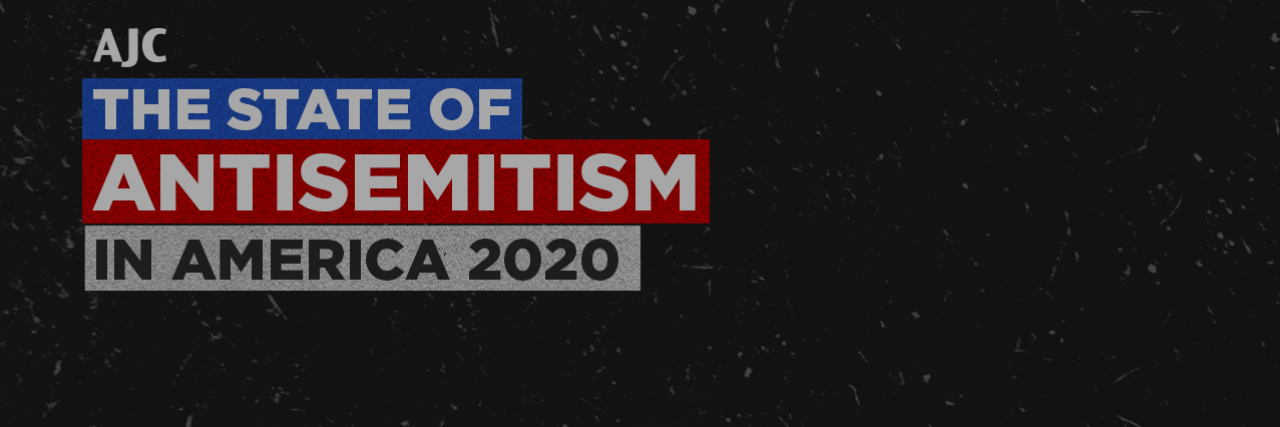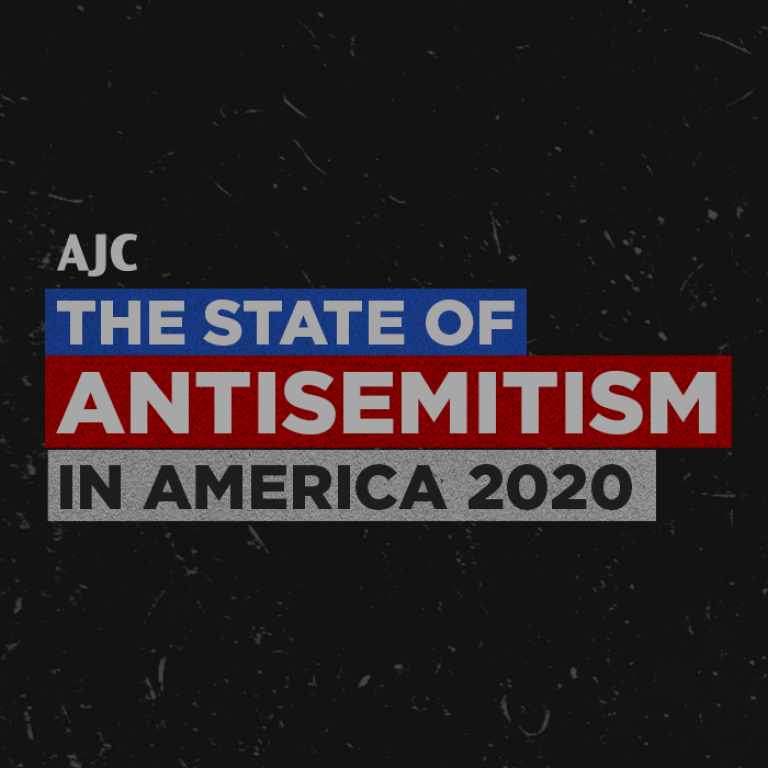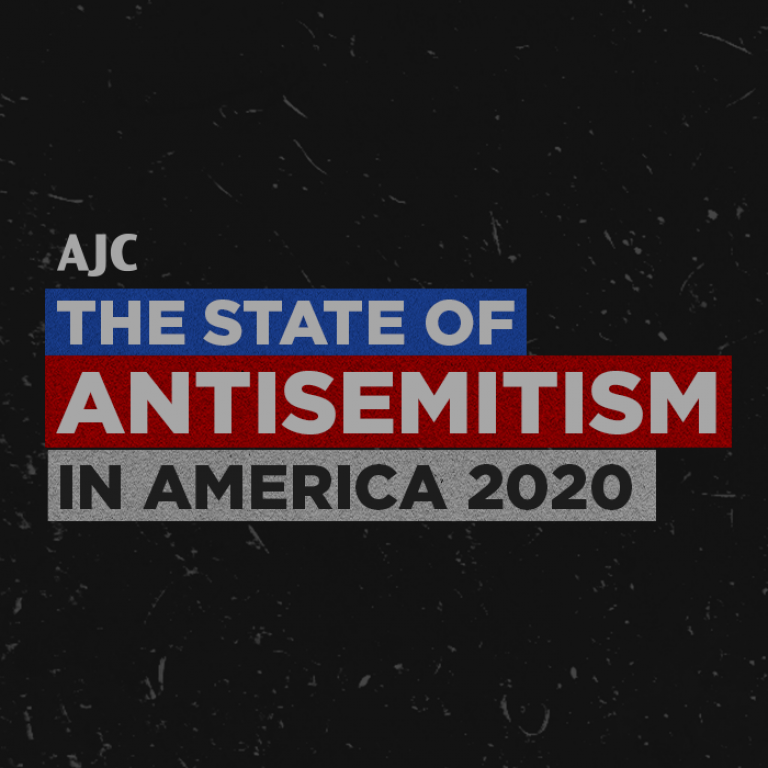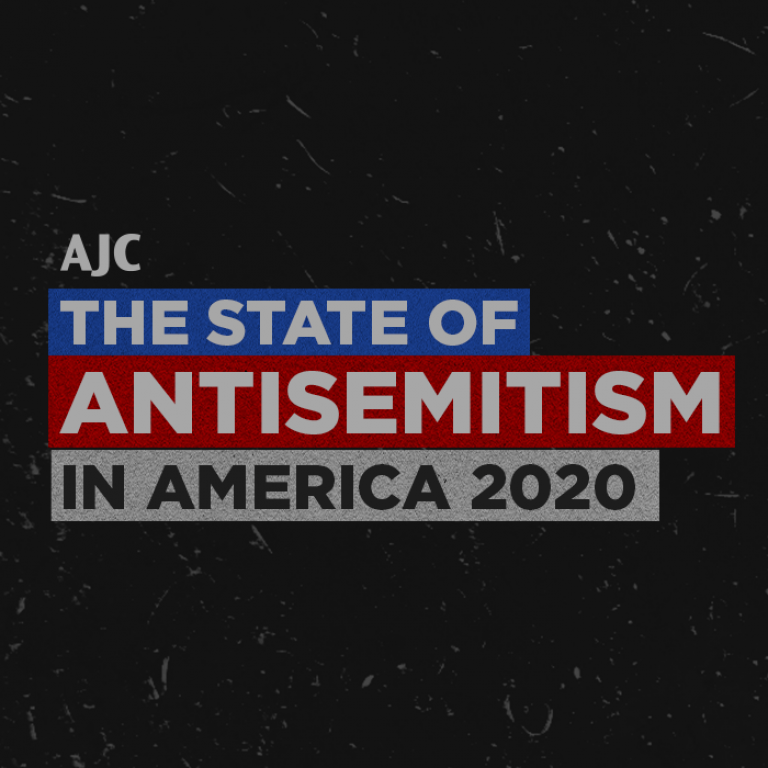October 26, 2020 — New York
American Jewish Committee’s first-ever State of Antisemitism in America Report finds anxiety among American Jews and a disturbing lack of awareness among the general public of the severity of antisemitism in the United States.
While 53% of U.S. adults say they are familiar with the term antisemitism and know what it means, nearly half of Americans do not, with 21% saying they have never heard the word and 25% saying that, while they have heard it, they are unsure what it means, AJC found in its new national survey.
Familiarity with the term antisemitism is linked to education levels. 79% of college graduates know what it means, compared with 58% of those with some college experience, and just 27% of those with a high school diploma or less education. Those who say they never heard the word antisemitism are 36% of respondents who have a high school diploma or less education, 14% of those with some college education, and 9% of college graduates.
The AJC study, released on the eve of the second anniversary of the Tree of Life synagogue massacre in Pittsburgh, when 11 worshippers were killed, is based on parallel surveys of American Jews and the general public in the United States. The Jewish survey is the second annual comprehensive poll of American Jews on their perceptions and experiences of antisemitism in the United States. The survey of the general public is the first conducted by AJC on the subject.
“What American Jews and the general public are saying in these surveys, for us, is a clarion call for a stepped-up, multi-pronged response to rising antisemitism in the United States,” said AJC CEO David Harris. “That nearly half of the American population does not even seem to know what antisemitism is can only increase American Jews’ concern about their own security and well-being.”
The AJC surveys found that while nearly nine in ten American Jews (88%) believe antisemitism in the U.S. today is a very serious (37%) or somewhat of a (51%) problem, only 63% of the general population agree, with 19% identifying it as a very serious problem and 43% saying it is somewhat of a problem.
Looking back over the past five years, more than four out of every five Jewish respondents (82%) say antisemitism has increased during that period, compared to only 43% of U.S. adults who say so, with 14% of Jews and 39% of U.S. adults saying it has stayed the same.
The number of American Jews who say they have avoided certain places or events out of concern for their safety as Jews increased to one in three (31%) from one in four (25%) in the 2019 AJC survey. Fifty-five percent of Orthodox, 43% of Conservative, 33% of Reform, 32% of Reconstructionist, and 24% of Secular Jews answered yes in the 2020 survey to taking such preventative measures.
Twenty-four percent of American Jews say they have avoided publicly wearing, carrying, or displaying items that might identify them as Jews since the Tree of Life shooting in October 2018.
More than one in three American Jews (37%) reported being the target of an antisemitic incident, such as a physical attack or an antisemitic remark online or in person, by mail, or by phone, in the past five years. But, as in 2019, three-fourths of the Jewish respondents who were targeted (76% in 2020, 75% in 2019) did not report the incident. More than four in ten (43%) Jewish young people between the ages of 18 and 29 say they have either personally experienced antisemitism on a college campus or know someone who has.
Overall, 52% of American Jews say the status of Jews in the U.S. is about the same as it was a year ago, while 43% say it is less secure, and only 4% say it is more secure. The view of Jewish security is consistent among the various denominations of Judaism. Forty-five percent of Orthodox, 46% of Conservative, 43% of Reform, 48% of Reconstructionist, and 42% of Secular Jews say they are less secure, while 53% of Orthodox, 45% of Conservative, 50% of Reform, 51% of Reconstructionist, and 54% of Secular say the status of Jews is about the same as a year ago.
Defining Antisemitism
The AJC surveys found a large discrepancy between Jews and the general U.S. population in viewing what constitutes acts of antisemitism. While nearly half (48%) of U.S. adults say they have witnessed at least one antisemitic incident in the past five years, their evaluation of what is and is not antisemitic does not appear to be influenced by Jewish organizations or individuals.
Nearly two thirds (65%) of U.S. adults said it would make no difference in their opinion of a given statement or idea if a Jewish individual or an organization considered it to be antisemitic. Only 25% said that this would make them more likely to consider that idea or statement antisemitic.
Respondents to both surveys were read three statements related to Israel and asked to indicate it they thought the statement was antisemitic or not.
-- 85% of the American Jews and 74% of the general public agreed that the statement “Israel has no right to exist” is antisemitic, indicating that large majorities of both Jewish and non-Jewish Americans believe anti-Zionism—the belief that Israel has no right to exist—to be a form of Jew-hatred.
-- 84% of the Jewish and 55% of the general respondents said the statement “the government only supports Israel because of Jewish money” is antisemitic.
-- 76% of Jews and 50% of U.S. adults said the statement “American Jews are more loyal to Israel than to America” is antisemitic.
Holocaust Education
Three-quarters of U.S. adults (76%) report they know a lot (37%) or something (38%) about the Holocaust, while 24% say they don’t know much or know nothing at all. In contrast, 84% of American Jews know a lot about the Holocaust, and 15% say they know at least something.
Teaching about the Holocaust is favored by both groups, though to differing degrees. 91% of American Jews and 68% of U.S. adults say it is very important to teach middle and high school students the history of the Holocaust.
Political Parties
Results from both surveys indicate more Americans attribute antisemitic views to the Republican Party than attribute them to the Democratic Party. Majorities of respondents in both surveys say the Republican Party holds a lot or some antisemitic views. More than two-thirds of American Jews (69%) and over half of U.S. adults (52%) say the Republican Party holds at least some antisemitic views, compared to 37% of American Jews and 42% of the general public who say the same about the Democratic Party.
Sources of Antisemitism
Asked about the threat posed by the three primary sources of antisemitism, 89% of the Jewish respondents said the extreme political right poses a threat to American Jews, with 49% saying it’s a very serious threat; 61% said the extreme political left, with 16% saying it’s a very serious threat; and 85% said extremism in the name of Islam, with 27% saying it’s a very serious threat.
The State of Antisemitism in America surveys were conducted via telephone for the non-partisan American Jewish Committee (AJC) by the independent research firm SSRS. National representative samples of 1,334 Jews, ages 18 or older, were interviewed from September 9 through October 4, 2020, and 1,010 general population adults, ages 18 or older, from September 15-20, 2020. The margin of error for the survey of American Jews is plus or minus 4.2%, and for the survey of U.S. adults it is 3.7.





